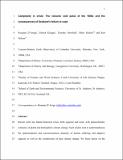Complexity in crisis : the volcanic cold pulse of the 1690s and the consequences of Scotland’s failure to cope
Abstract
Recent work has linked historical crises, both regional and local, with palaeoclimatic estimates of global and hemispheric climate change. Such studies tend to underemphasize the spatiotemporal and socioeconomical disparity of human suffering and adaptive capacity as well as the complexities of past climate change. We focus herein on the effects in Scotland of a severely cold climate episode in the 1690s, associated with major tropical volcanic events including a large unidentified tropical eruption in 1695. A tree-ring based summer temperature reconstruction from the northern Cairngorms region identifies the 1690s as the coldest decade in Scotland for the last 750 years. Archival sources meanwhile reveal the 1690s as likely the worst era of crop failure, food shortage, and mortality ever documented in Scottish history. The connection appears simple - volcanic cooling triggered famine - but the drivers towards famine are far more complex. Although the unusual coldness of the 1690s was near-hemispheric in scale, it had a differential impact across north-western Europe. Within Scotland, both lowlands and highlands experienced dire conditions, but distinct factors exacerbated the suffering in each region. We integrate historical and palaeoclimatic records to explore the influence of the volcanic cold pulse of the 1690s and its consequences in Scotland. We find that while cooling temperatures characterized the regional to larger-scale climate, vulnerability and response potential were diverse and shaped by local circumstances. The Scottish crisis of the 1690s, in the context of the kingdom's failing economy, influenced investors from all parts of society, including the nobility and entire communities, to fund the ill-fated expedition to colonize Darien in modern-day Panama. The climate crisis and the colony's collapse hindered Scotland's already sluggish economy, motivating unification with England soon after.
Citation
D'Arrigo , R , Klinger , P , Newfield , T , Rydval , M & Wilson , R 2019 , ' Complexity in crisis : the volcanic cold pulse of the 1690s and the consequences of Scotland’s failure to cope ' , Journal of Volcanology and Geothermal Research , vol. In press . https://doi.org/10.1016/j.jvolgeores.2019.106746
Publication
Journal of Volcanology and Geothermal Research
Status
Peer reviewed
ISSN
0377-0273Type
Journal article
Description
Suthors thank the National Science Foundation Paleoclimatological Perspectives on Climatic Change (P2C2) program, including grant nos. AGS-1502150 and AGS 1502224. The Scottish Pine Project (http://www.st-andrews.ac.uk/~rjsw/ScottishPine/) acknowledges funding through the EU project “Millennium” (017008-2), Leverhulme Trust project “RELiC: Reconstructing 8000 years of Environmental and Landscape change in the Cairngorms (F/00 268/BG)”, and the NERC project “SCOT2K: Reconstructing 2000 years of Scottish climate from tree rings (NE/ K003097/1). MR acknowledges funding through the EVA4.0 project 583 (CZ.02.1.01/0.0/0.0/16_019/0000803).Collections
Items in the St Andrews Research Repository are protected by copyright, with all rights reserved, unless otherwise indicated.

